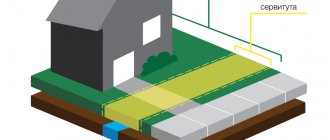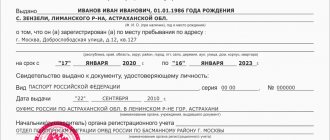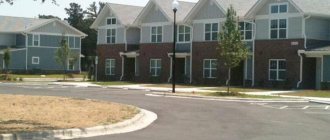Home / Housing rights / Registration / How to obtain temporary registration
Back
Published: 07/01/2018
Reading time: 8 min
0
1058
Temporary registration issued for citizens of the Russian Federation can be carried out in any residential premises located on the territory of Russia. If we are talking about registration of documents in a residential premises for which ownership is registered, then this option of temporary registration is simpler. However, it is not always possible to obtain temporary registration in such premises and it is necessary to register in municipal, communal or non-privatized housing. How can this be accomplished and what will need to be prepared in terms of documentation?
- In which housing can I obtain temporary registration with the right of residence?
- Temporary registration in public housing
- Temporary registration and non-privatized housing
- Communal apartment and temporary registration in it
- Registration in rental housing
- Temporary registration in mortgage housing
- Registration in a private house
- Apartments and temporary registration
- Temporary registration in non-residential premises - is it possible?
In which housing can I obtain temporary registration with the right of residence?
In accordance with the current standards of registration and migration legislation, temporary registration is currently possible in any residential premises located on the territory of the Russian Federation.
However, when applying for this type of registration, you should remember that it should not only allow you to receive certain government services, for example, payment of pensions or medical care, but also provide the right of residence. In accordance with these features of temporary registration, the following types of residential premises should be distinguished:
- an apartment for which ownership has been registered from a legal point of view , or a house built as part of individual housing construction, for which ownership rights have also been registered;
- municipal housing, the use of which is carried out on the basis of a social tenancy agreement. On the basis of such an agreement, temporary registration of a citizen can be carried out, however, its validity period will be limited by the validity period of the agreement itself;
- non-privatized housing, the use of which occurs on the basis of an issued warrant. Temporary registration in such residential premises is carried out only with the consent of the state, and the validity period cannot exceed five years, that is, the maximum period for the person who issued the temporary registration;
- mortgage housing (regardless of what type it is). Registration can be completed on the basis of the consent of the bank (due to the presence of such residential premises as collateral), and its validity period can be set from one month to five years at the discretion of the registered person. However, such registration has a number of its own characteristics;
- communal housing (apartment or house). Registration in such premises can be carried out for a period of up to five years, however, as in the case of mortgaged housing, it will have its own characteristics;
- apartments , as a place of temporary registration, today act as such residential premises, the period of registration in which is limited by the actual period of residence in accordance with the concluded rental agreement. Registration of temporary registration in such a residential premises is also associated with a number of features that should be taken into account.
Registration in apartments
This is: From the point of view of the law, a person can live in any place (house, workshop of a building, car), but without registration.
Registration can only be done in residential premises. Therefore, to obtain registration, the following actions are possible: Apartments are also intended for rental, since such commercial buildings are located in the city center, which is very convenient, especially in large cities.
In addition, the search for tenants is transferred to the management campaign, and the owner is freed from hassle and calmly receives income from renting apartments. Temporary registration in apartments takes place at the Federal Migration Service (FMS).
Temporary registration in public housing
Registration of temporary registration in housing that is on the balance sheet of a particular municipal entity always takes place only taking into account the current norms of registration legislation operating at the federal level, as well as legislation in the field of operation of residential premises within the region where a specific municipal living space is located.
Registration of temporary registration in municipal housing is possible only if, during registration actions and when all registered persons live in the apartment, there is no violation of current sanitary standards, as well as social norms for the use of a particular residential premises.
When registering at the place of stay in municipal housing, temporary registration is first issued to the person who acts as the tenant of the residential premises . After temporary registration has been issued to such an employer, he has the right to issue registration to other persons. However, if registration may entail a violation of current sanitary or social standards, then registration of other persons may be refused.
Who pays, the tenant or the landlord?
The LLC owns, by right of ownership, non-residential premises in the basement of an apartment building. Previously used as an office, but due to the LLC moving to another location.
Dear readers! Our articles talk about typical ways to resolve legal issues, but each case is unique.
It is important to remember that in some hostels there is such a service as temporary registration without reference to any premises (room). This is allowed by regulations, but registration in this case will be temporary and will not give the right to occupy a specific residential premises, even for temporary residence.
Temporary registration and non-privatized housing
The registration procedure for non-privatized housing is practically no different from the similar procedure associated with municipal housing, with the difference that non-privatized housing may belong not only to the municipality, but also to other organizations, for example, large manufacturing enterprises.
Temporary registration in such residential premises is also carried out through the migration authorities, but the use of legal norms regarding compliance with social and sanitary standards when registering citizens of the Russian Federation in the area of such residential premises is not carried out so strictly, since the decision on whether to register on a temporary basis or not this or that person is received by the owner of the premises.
In order to carry out temporary registration for one or another person, it is first necessary for a citizen of the Russian Federation in whose name the rental agreement for the premises has been drawn up to obtain permanent or temporary registration in a non-privatized residential premises. Only after this can temporary registration be issued to one or another person who submits an appropriate application for this.
It should be remembered that when applying for temporary registration, priority in the formation of the registration file will be given to the relatives of the person with whom the rental agreement for the premises has been concluded, and only after the relatives or other family members of the tenant of the premises have been registered, a similar procedure can be carried out in relation to other persons who submitted such an application.
Is it possible to register there temporarily or permanently?
They cannot register a citizen either temporarily or permanently in non-residential premises. A complete list of places where legal permanent residence or temporary registration of an internal migrant is possible is listed in the annex to Resolution No. 713 of July 17, 1995.
According to the current Government Decree No. 47 of January 28, 2006, the place of registration must be officially considered residential. To do this, you will need to prove to the local municipality that it is suitable for habitation and that it complies with sanitary, epidemiological and hygiene standards. The decision to recognize the premises as residential is made by a special commission.
It was allowed to register and obtain permanent registration in a country house in 2013. To do this you definitely need:
- Strengthen the walls and foundation.
- Provide water and electricity.
- Equip a sewer system.
- Insulate.
After all these manipulations, you need to contact Rosreestr to register the building. And only with a certificate from Rosreestr does it make sense to go to the municipality to register registration at the dacha (read more about all the nuances of living in a non-residential building and transferring it to residential premises in a gardening partnership).
Important! In 99.9% of cases, permission to permanently register at a dacha has to be obtained through the court; without delay, it is given only to citizens who have nowhere else to register.
Is there a penalty for registering?
There is no punishment for registration in non-residential premises in Russian legislation because no one will register a citizen in such a place.
Communal apartment and temporary registration in it
Before talking about the specifics of temporary registration in a communal apartment, it is necessary to clarify which owner of such a collective living space is. Currently, there are two types of communal residential premises: premises that are owned by municipalities, as well as premises that are purchased into private ownership.
In the event that we are talking about premises owned by the municipality, it will be necessary to obtain the consent of the owner in the person of a representative of the administration, as well as roommates.
If we are talking about an apartment that was purchased into private ownership, then only the consent of the roommates will be required , while obtaining similar consent from the owners of other rooms will not be required.
However, it should be taken into account that for apartments that are registered as shared ownership, you will have to obtain consent for temporary registration from all owners, even those who do not use the premises.
Registration in rental housing
For cases where we are talking about rented housing, temporary registration has its own characteristics. So, if we talk about obtaining the consent of the homeowner, it is often necessary to conclude a special agreement, according to which not only will the use of the residential premises be carried out, but also a mechanism will be stipulated by which the registration and payment of increased utilities will be carried out by the registered person.
When renting privately owned housing, obtaining the consent of the owner of such residential premises to carry out registration procedures is mandatory.
Without the consent of the owner of such premises, it is only possible to register a person who is a close relative of someone who is already registered there , that is, a child or parent (for the latter, this rule applies only if in relation to such a person there is a medically confirmed need for constant care provided outside a health care facility).
Temporary registration in mortgage housing
The main feature of mortgaged housing should be considered that it is pledged to the bank until the target loan taken is fully repaid. And based on this feature, it should be taken into account that the registration procedure will be carried out only after the bank allows such a procedure to be carried out .
In the case of permanent registration, the question of the possibility of its implementation in mortgaged housing is a rather difficult problem to resolve precisely because such housing is pledged to the bank. If we are talking about carrying out the procedure for temporary registration in mortgaged housing, then the bank most often agrees to such a procedure.
Only the person who is the bank's borrower can register for mortgage housing. This feature is formed on the basis that a mortgage loan does not allow the official rental of housing.
Registration in a private house
The registration procedure in a private house does not differ from the similar procedure provided for an apartment located in an apartment building. However, it should be borne in mind that carrying out such events in relation to a private house must be accompanied by obtaining additional documents . One of these additional documents is an extract from the house register about the number of registered persons.
In the event that, from the point of view of compliance with sanitary or social standards, some kind of violation occurs, or the house is considered non-residential due to its condition or location on lands on which a residential building cannot be built, then the implementation of temporary registration will be fraught with difficulties from the point of view of preparing the certificate of registration at the place of stay.
Russians will be allowed to register in non-residential premises. New in the law on
The Council under the President of the Russian Federation for the Development of Civil Society and Human Rights has prepared amendments to the legislation allowing people without permanent registration to enjoy all rights on an equal basis with those who have a “registration”
. They will also expand the use of a citizen’s actual place of residence. Their discussion should take place in July.
What rights is deprived of a person without registration?
the problem is that millions of Russians lose the right to pensions and schools because they do not have registration. There are more and more “legally homeless” people in Russia.
Moreover, many of them are far from poor people. But they do not have a “registration”. Because of this, they are deprived of many social rights. Regional pension and children's surcharges, kindergartens and schools. They cannot even stand in the elections.
How to obtain temporary registration in a rented apartment?
First of all, the absence of a permanent place of registration is a reason to deny a person many rights. Yes, registration does not give the right to housing, but, unfortunately, it is the “key” to receiving social security in a particular region.
Without a “registration”, it is impossible to receive regional pension supplements, regional benefits and payments. It is difficult to get medical care, kindergarten and school for the child. Despite the legalized “freedom of movement,” it is still more common and convenient for clinics to deal with patients at “sites.”
The same employers, for example, require the candidate to provide registration, many of them cannot even explain why. The main problems with receiving any additional payments arise mainly when they are financed from the regional budget. Without a “registration”, a loan is more expensive, and you won’t be able to get a driver’s license.
The pension system has not had this problem for 20 years. A person can apply for a pension at the place of actual residence. The issue with the passport has also been resolved. That is, in a number of areas this problem has been solved.
Forced eviction: you can remove a person from an apartment even without his consent
New increased land tax. Identification of unregistered country houses
The Presidential Council for Human Rights proposes to allow people to register in non-residential premises. Then it will be possible to “register” not only in the apartment, but also in the basement and office.
The increase in the number of citizens whose “address is neither home nor street” was facilitated by changes in legislation. In 2005, the state decided to strengthen the rights of property owners by allowing them to evict people registered there from their apartments and houses.
The eviction of citizens from residential premises was even provided for in the Housing Code of the RSFSR of 1983. But such a measure was applied only to notorious hooligans who broke and destroyed everything around, spoiled living quarters and prevented neighbors from living in peace. Respectable citizens in those days had approximately the same rights as property owners. It was impossible to just leave them on the street.
As Anna Konyaeva, director of the Legal Services Center, notes, the procedure for “extracting” a person from an apartment, that is, removing a citizen from registration at the place of residence, has become used much more often.
According to Konyaeva, it is possible to discharge a person from an apartment even without his consent. The most common cases are when this is done by a court decision on eviction and recognition as having lost the right to use residential premises.
The only exceptions are close relatives. Thus, it is almost impossible to expel a spouse from the apartment; after all, he is a family member. But the former - easily.
If an apartment was purchased before marriage, it is not considered common property, so the ex-spouse risks ending up on the street.
The law protects the rights of minors - apartment owners
It should be noted that the law in this case does not spare even minors. “The Housing Code provides for the unconditional right to move a minor into an apartment where one or both of his parents are registered,” says Anna Konyaeva. But as soon as parents lose this right, their children also lose it.
But the law protects the rights of minors - apartment owners. Without guardianship authorities, they cannot be discharged from the apartment. But if the child is simply registered in an apartment at a specific address, and neither he nor his parents are the owners of this housing, the child’s discharge occurs without the participation of the guardianship authorities.
As Oleg Sukhov, president of the Guild of Real Estate Lawyers, explains, you can even discharge your own child, but only if he receives permanent registration at the place of residence of the second parent.
Why are there more and more people without “registration”?
A number of legislative aspects also contribute to the increase in the number of people without “registration”. For example, you can be left without a place of registration on the initiative of a government agency. The authorities resort to this measure of influence in the fight against “rubber” apartments. Moreover, having lost registration in such an apartment, a person will be brought to administrative and even criminal liability.
Many Russians live permanently in their dachas. The inability to register for them is also the reason for the increase in people without “registration”. Formally, it is already possible to register at a dacha, but the procedure remains complicated; registration will have to go through the court. The growth of the market for apartments, which also cannot provide their owner with permanent registration.
Recently, another category of people without “registration” has appeared - these are families whose apartments were taken away for non-payment of the mortgage. And this is the most affected category of people. Without an address, they end up not only on paper.
There are also many people in Russia who have permanent registration, but it does not coincide with their actual place of residence. And they face many challenges in the region where they are located.
Apartments and temporary registration
Apartments, as a type of housing, appeared on the real estate market relatively recently. This is commercial real estate that is rented or purchased by people as an opportunity to invest money in real estate with the possibility of further commercial operation.
It will not be possible to obtain permanent registration in the apartments, since apartments are not classified as residential real estate. If we talk about temporary registration, then it can be obtained quite easily even if such premises are used as rented housing.
Temporary registration in non-residential premises - is it possible?
Registration of temporary registration in various types of non-residential premises is always a rather complex process, since the very characteristics of the premises indicate that such premises do not belong to the housing stock and cannot belong until such time as it is re-registered as residential in its own way legal characteristics.
If the temporary registration was issued in a non-residential premises, then it may have a limited validity period, and the possibility of its extension is very controversial.
Temporary registration, as a form of registration for citizens of the Russian Federation, can be issued in almost any residential premises. However, for this it is necessary to comply with all available legal nuances. If we are talking about registration in non-residential premises, then for such premises registration will have its own nuances that should be taken into account.
Up
Is it possible to live in non-residential premises? Is this legal? Registration is available elsewhere.
15.1.
Margo! Residence in non-residential premises is not permitted for the following reasons: it is not intended for residence, but for carrying out production and work activities. You cannot register in this room either temporarily or permanently.
Did the answer help you? Yes No 15.2. At the legislative level, there is no prohibition on living in non-residential premises. Good luck and all the best.
Did the answer help you? Yes No 15.3. If this is your non-residential premises, then you have the right to live in non-residential premises.
Nobody can prohibit it. Can be registered in a residential area.
Did the answer help you? Yes No 15.4. Of course you can. It is your right.
No one has the right to ban you, but of course you won’t be able to register there. Did the answer help you? Yes No 16. I want to buy housing in a new building.
We liked everything and were satisfied.
But when it came to signing the contract, I discovered in it that the object has the status of non-residential premises of a hotel apartment complex for temporary residence. Tell me what to do in this situation? Since I want Moscow registration and a full-fledged apartment.
16.1. It’s better then to look for another construction site, and it’s better for you not to have anything to do with this complex.
Did the answer help you? Yes No 16.2.
• Hello, There cannot be any full-fledged apartment here, if according to the documents it is not a residential premises, you will not be able to register in it. I wish you good luck and all the best!
Did the answer help you? Yes No 17. I have the following question: I was registered in a residential emergency premises, according to the court, my premises were recognized as non-emergency and I transferred it to a non-residential one, but the registration remained.
Now the house is being prepared for reconstruction, all the residents have been resettled except me. What should I do to get housing or compensation for my premises? Thanks in advance for your answer. 17.1. Reconstruction is not the demolition of a building, it means that after its implementation you will be able to use the non-residential premises for its intended purpose; compensation in this case is not expected, since you will not lose the premises that belong to you. Reconstruction is not the demolition of a building, it means that after its implementation you will be able to use the non-residential premises for its intended purpose; compensation in this case is not expected, since you will not lose the premises that belong to you.
Resettlement is only possible for persons occupying residential premises, which also does not apply to you. Did the answer help you? Yes No 18. I have the following question: You can transfer the dacha from non-residential premises to residential premises into private ownership, into individual housing construction and combine three plots into one.
The plots are located in the residential sector, 50 meters from me there is a registration. They promised us that the administration would formalize it, but they’ve been dragging it out for 2 years now; I can’t transfer the land. I am a guardian and don’t have my own home, registered under 18.1.
Good day It all depends on the category of the land plot, it is not a fact that it will be transferred to individual housing construction. Good luck to you. Anna Titova. Did the answer help you? Yes No 19. I moved the apartment to non-residential premises and did not live there. Paid as non-residential. I rent it out. But she remained registered there for some time.
But she remained registered there for some time. Now the housing department is demanding money for rent for the period of registration.
Although the payment was already made for non-residential premises. And there are agreements and an invoice for payment with the relevant authorities.
19.1. The costs of maintaining and repairing the common property of the MK are assigned to the owners of non-residential premises. The main differences in the status of owners of non-residential premises from owners of residential premises, in particular, are: the right to enter into contracts for utility resources directly with resource-supplying organizations; the obligation to pay for certain utilities, rent of premises at tariffs (prices) that differ from the tariffs and prices established for the population; and the lack of the right to receive subsidies and subsidies to pay for the maintenance and repair of the common property of an apartment building (MK).
Did the answer help you? Yes No 19.2. Zlata, contact the housing department in writing with a request for a recalculation and attach documents confirming the circumstances to which you refer.
If they refuse, go to court. Although how you could register there is not entirely clear. Did the answer help you? Yes No 19.3.
The actions are not legal under the Criminal Code. Contact the housing inspection and prosecutor's office to conduct an inspection. Good luck to you and all the best. Did the answer help you? Yes No 20. When repossessing my only home for debts, will they take into account that my only home is a dacha, 5 acres, house 88 sq.m.
according to the certificate of ownership, is the intended purpose: “non-residential building with the right of registration”? Registration was done through the court, in fact the residential area (with heating) was only 40 sq.m.
The rest is like a barn. Please tell me, will the only non-residential (according to documents) premises be seized for debts? Thank you. 20.1. Dear visitor! Alas, a non-residential building may well be foreclosed on; the issue will have to be resolved in court. Good luck to you and all the best, thank you for contacting us!
Did the answer help you? Yes No 21. Is it possible to register in non-residential premises?
(i.e. there is a room on the technical floor of a multi-storey building) 21.1. From the point of view of housing legislation, in conjunction with the legislation on registration of citizens at the place of residence and place of stay, registration is impossible. However, in practice, military personnel, for example, were often registered at the address of military units.
However, in practice, military personnel, for example, were often registered at the address of military units.
Did the answer help you? Yes No 21.2. Registration of citizens is carried out in residential premises in accordance with Decree of the Government of the Russian Federation of July 17, 1995 N 713. Did the answer help you? Not really









